I was a teenager, set to take the weekend night shift at the local classic rock radio station. DJ Chuck Buckle was showing me the ropes. The studio was dim-lit, VU meters and console lights, the TriCity color weather radar glowing from a corner screen. Buckle cued up “Breakdown.” A simple kick drum and snare paired with a laid back electric piano slipped out slow and easy over the airwaves.
“Hear that?” Buckle asked, pulling at his mangy beard. Chuck looked sort of like a homeless Mick Fleetwood, if you shot Mick out of a cannon into a liquor store.
“Hear what?” I replied.
“Exactly,” he said as the guitars slid into the groove low and tight. “It’s sparse. That crap music they make these days don’t give you no space to think. Petty, he always gives you space.”
Chuck held up one finger for quiet and opened the mic. “11:49 under grey skies and overnight threats of rain.” He leaned over and took a long drag off his Marlboro Gold. “Cold tonight,” Buckle said, his voice an octave deeper. “Cold tomorrow. Warm inside right here with Tom Petty and the Heartbreakers. I’m Chuck Buckle leaving you now, handing it over to . . . ” He nodded for me to speak.
“Heartbreak Kid,” I said, quick, high-pitched and grinning. Buckle rolled his eyes. “DJ Jamie James, riding with you, taking you through the long night….”
He switched off the mic just as Petty began to sing about fear and pretending, letting go to hold on, how sometimes you need a stranger to get you through the night.
“Kid, listen,” Buckle said. “Don’t try so hard. Just be yourself.”
You make a great musical statement: “Trouble is where bands begin.” How did Tom Petty go from Mudcrutch to a solo artist with the Heartbreakers?
When Tom went from Mudcrutch to being a solo artist in that period before the Heartbreakers formed, it wasn’t by choice. He was young, unknown, and hoping for a career. He had a record contract, but that’s not a whole lot to have. It’s a common misconception that securing a record deal means you’ve arrived, that a career is underway. But, really, a record contract is nothing more than a lottery ticket: you need it to win, but your chances at winning are slim. Denny Cordell had lost his faith in Mudcrutch’s ability to become a recording band, which is different from being a live band. But he hadn’t lost his faith in Tom Petty. So, for the first time in his life, Petty became a solo artist—because that’s the direction in which life had kicked him. It was not by design. But that, too, didn’t last long. He ultimately wanted a hybrid: to be a bandleader but also to be in a band. And that’s what he created with the Heartbreakers.
How would the legacy be different if they had stayed a band instead of Tom turning into a frontman?
I don’t think it would have panned out. And the answer to your question hinges both on issues of creativity and issues of ambition and leadership. As Mike Campbell says, “No one is as ambitious as Tom Petty.” Without Petty’s drive, things would have slowed. The band recognized it, I think, and most were grateful that it was there. But Petty also built enough confidence, enough awareness that he had something, a voice and vision, that was all his own. When you listen to a Tom Petty recording, you know who it is. He’s got a band with a sound, and he’s got a presence as a frontman and a writer. Very few acts get that far. If it was easy to do, we’d have more examples of it to show. But being bandleader is a crap job in many respects. My friend Chuck Prophet recently shared with me Jim Dickinson’s take on the subject: “I wouldn’t wish the job of bandleader on my worst enemy.”
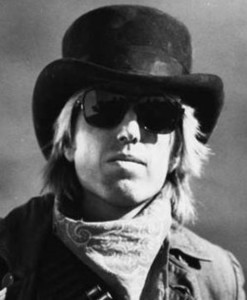 Reclusive, ambitious, mysterious, meticulous, focused, businessman, coolest guy in the room – your book describes Tom as all of these things. “Tinted windows on his soul” was my favorite. One always got the feeling that Tom Petty was a hard guy to get a handle on. How did you approach that as a writer?
Reclusive, ambitious, mysterious, meticulous, focused, businessman, coolest guy in the room – your book describes Tom as all of these things. “Tinted windows on his soul” was my favorite. One always got the feeling that Tom Petty was a hard guy to get a handle on. How did you approach that as a writer?
I simply responded to the situation Tom gave me. He opened the door and invited me in. We talked, for many hours, over a few years. But I saw, sitting next to him, that he could be all the things you describe. Without contradiction. Rock and roll has the remarkable, beautiful capacity to change people’s lives. Glen Campbell, Elvis Presley, Joe Strummer, Carl Perkins, Tom Petty. But in changing those lives, rock and roll also demands a lot of the person undergoing such changes. They need to be several people, they need to find ways to protect themselves, they need to figure out how to trust and when not to. When pressed, I would have to say that I hope my own sons don’t get such a formidable task presented them. I hope rock and roll gives them its gift without taxing them so heavily. They probably wouldn’t be able to do it as well as Tom Petty has. Here’s a guy that’s kept the band together for forty years. Holy shit, right? And he’s still making records, great records. Still cutting those records live. He had to be all those things you mention. He’s pulled off a miracle.
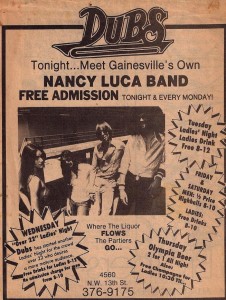 I talked to Rickey Medlocke recently and he mentioned Dub’s nightclub and how those miniskirt contest gigs were so important in the evolution of Blackfoot – what was it about Dub’s?
I talked to Rickey Medlocke recently and he mentioned Dub’s nightclub and how those miniskirt contest gigs were so important in the evolution of Blackfoot – what was it about Dub’s?
Dub’s nightclub was to bands like Mudcrutch what the Kaiserkeller in Hamburg was to the Beatles. These venues were places where bands could become, places of incubation, of self-creation, of informal apprenticeship. In them bands would play multiple sets each night, would play primarily cover material (learning what good song construction felt like from the inside), and would live close to a world in which sex was being sold, whether in the form of the topless dancers at Dub’s or the Reeperbahn’s various possibilities for afterhours pleasure. If there ever will be a true “school of rock,” it will probably need to look something like one of those places. So, really, there will likely never be a true school of rock. Not like that. For better or for worse.
What was the single most important event in shaping Tom Petty’s career?
I hate to boil it down to this, but those individuals who have to process childhood abuse are shaped by that experience in ways others will never fully comprehend. At five, Petty saw his father, his protector, turn into something awful. Earl Petty wasn’t always abusive, but the young Tom Petty didn’t know when it was going to happen. That brings about a constant uncertainty. The world goes dark. I think music, songwriting in particular, would become for Petty a place in which things made more sense. So he went there often. And he created something of abundance and character. Art saved his ass. But I don’t think there’s any way to fully emancipate oneself from that kind of background. When childhood abuse begins, the world stops making sense. It’s up to the individual to create sense. That’s where songs came in.
I was listening to “Breakdown” earlier today and struck by how different it sounds – even from the songs of that same era. Talk us through the making of that track.
I think that track reflects all that band had learned from Mudcrutch forward. Listen to the dynamics—that track goes way down and comes way up, following the lyric. Listen to the space—those players have learned to play only what is essential. Rarely does an electric piano cut through as Benmont’s does in that recording. But they made space for it. And that’s an achievement more remarkable than anyone who doesn’t make records would know. Listen to Petty’s voice—he’s got a point of view, and it feels honest. How many recordings feel like they really have to be made? That one does. Petty pulls off urgency without ever overselling the emotion. He’s no Melissa Etheridge. And some of the recording’s best features, including the primary Campbell guitar figure and the background vocals, come at the suggestion of someone not in the band, a fellow musician, Phil Seymour, I think. The Heartbreakers were secure enough to let in a few good ideas from the outside when the recording benefited from them. All of this, taken together, helps us to see what’s working there. It’s a track that spoke quietly but nonetheless showed the world that something special was going on here.
I’d never heard the story of how Petty let “Boys of Summer” get away. I’m trying to imagine what Tom’s version might have sounded like.
Petty has a wider range than people often give him credit for. So he’s capable of taking a song in any number of directions. His version could have been shaped in any number of ways. But it’s important to remember that when Petty first heard the demo, the chorus went to a minor. He suggested to Mike Campbell that the chorus needed to go to a major key instead. Campbell did make the change, but Petty never heard it with that fix. The next person to hear it wasn’t Petty, it was Don Henley. Would Petty have passed if he’d had the chance to hear the difference between the minor key chorus and the major key chorus? Maybe not. Who knows? But I do think that “Runaway Trains” might give us the best sense of what Petty might have done with the demo of what would become “Boys of Summer.” And “Runaway Trains” is a beauty, among my favorites. It’s laden with sequencers and drum machines, but it’s surely Tom Petty.
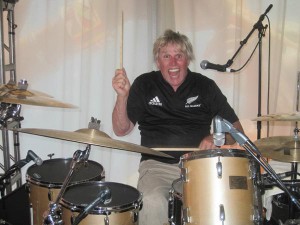 So there was this band with Tom Petty, Leon Russell . . and Gary Busey on drums?
So there was this band with Tom Petty, Leon Russell . . and Gary Busey on drums?
That period, between Mudcrutch and the formation of the Heartbreakers, may as well have been directed by Luis Bunuel. It’s a strange time, couldn’t be replicated if you wanted to replicate it. Petty was getting the kind of education in which he had to figure out what the lessons were, a bit like Homer in the Odyssey. Shit is going down that he had to make sense of. The teachers were Leon Russell, Brian Wilson, Terry Melcher, a whole cast of musicians and producers, in various states of creativity and decay. To me, it was a cornerstone in the education of Tom Petty. But he came out of it not wanting to be anyone but Tom Petty. That’s the best kind of education.
 Leon Russell, Bob Dylan, George Harrison, Johnny Cash, Jeff Lynne – Tom Petty must have the most stellar collection of mentors ever. It seems as if just the time he needed a guide, one showed up. What was it about Tom that attracted this sort of support?
Leon Russell, Bob Dylan, George Harrison, Johnny Cash, Jeff Lynne – Tom Petty must have the most stellar collection of mentors ever. It seems as if just the time he needed a guide, one showed up. What was it about Tom that attracted this sort of support?
Tom Petty has rock and roll cool. And it’s a very rare thing to encounter. I remember Jeff Lynne trying to describe what he and George Harrison saw in Tom, and he points to Petty’s “cool” and to that “voice.” The Southernness, not just of the voice but of the style as a whole, cannot be understated when you’re trying to figure out what made Tom Petty such a draw. He has the feel of the South in him. He has that kind of quiet that can erupt with its other that makes rock and roll good. He has intelligence that he doesn’t parade. Humor that waits for the moment rather than chasing every opportunity to get a line in. And, musically, when Tom Petty is around, good things happen. It’s a good package.
In the research for this bio, what’s the most interesting thing you discovered?
That Petty is a workingman. You can have all the talent in the world, be the best looking cat in the room, but if you’re not a worker, you won’t sustain your position in rock and roll. Petty has been almost tireless. He’s always hunting down that next recording, and then doing what it takes to get it out there.
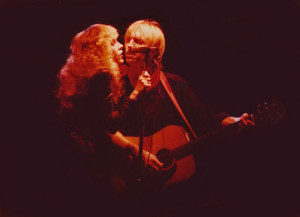 The relationship between Stevie Nicks and Tom seems complicated. Were they a couple? Co-workers? Friends?
The relationship between Stevie Nicks and Tom seems complicated. Were they a couple? Co-workers? Friends?
I pushed on this question, saying to him, after he told me they weren’t a couple, “You sure sound like a couple.” Tom looked at me and said, “We had our times.”
Where does Tom Petty go from here?
I believe that Tom Petty wouldn’t make another album if he didn’t feel like the next one could be his best yet. He’s been so consistent in creating great albums in which every track matters that, in that regard, his brand is stronger than any among his peers. But he’s also managed to act his age, meaning he’s made records about his moment, never tried to write “younger” because the market demanded that. Because of all that, it’s within the realm of possibility that Petty could make his best recording at age 78, and also tell us something important, something we need to know, about what it looks like there, what mortality feels like from his perspective, what remains interesting and what has fallen away, what’s funny, what’s strange, what matters. At 78 years old, he might make his Harvest or Blood on the Tracks. There aren’t many other artists I could say this about.
Thanks for your time, brother. Before we let you go, give us five Tom Petty deep tracks we need to go back and discover again.
I could make this list a hundred times and do it differently every time. But here’s one list of five: “Between Two Worlds” from Long After Dark, “Mystery Man” from the debut, “Let Yourself Go” from Mojo, “This Old Town” from Highway Companion, “Echo” from the album of the same name.
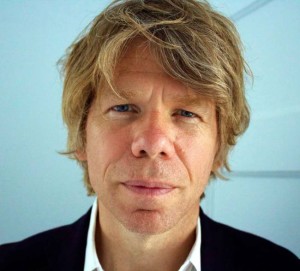 Warren Zanes holds a PhD in visual and cultural studies from the University of Rochester. He was a member of the Del Fuegos, and continues to record music. His work has appeared in The Oxford American, and he has served as a V.P. at the Rock and Roll Hall of Fame and is currently the Executive Director of Steven Van Zandt’s Rock and Roll Forever Foundation. He is the author of Petty: The Biography and Dusty Springfield’s Dusty in Memphis (33 1/3rd Series).
Warren Zanes holds a PhD in visual and cultural studies from the University of Rochester. He was a member of the Del Fuegos, and continues to record music. His work has appeared in The Oxford American, and he has served as a V.P. at the Rock and Roll Hall of Fame and is currently the Executive Director of Steven Van Zandt’s Rock and Roll Forever Foundation. He is the author of Petty: The Biography and Dusty Springfield’s Dusty in Memphis (33 1/3rd Series).


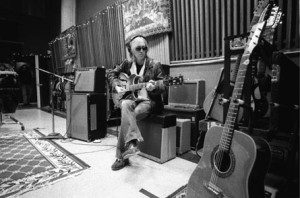
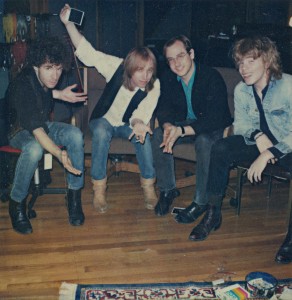


Hi, I only know rock n’ roll from the 1960s, but I like to read about bands and singers. The first time I saw Tom Petty, he had a short role in “The Postman,” which was a great film in my opinion. I asked my husband who he was, and of course he knew. I loved the music in The Postman, so I assumed some of it was written by Petty, but no. I looked up his songs and recognized one: Free Fallin’. Even I, in my ignorance, have heard that one and I love it. Thanks for the education. It is amazing he kept his band together for so long. I’m going to go listen to some more of his songs.